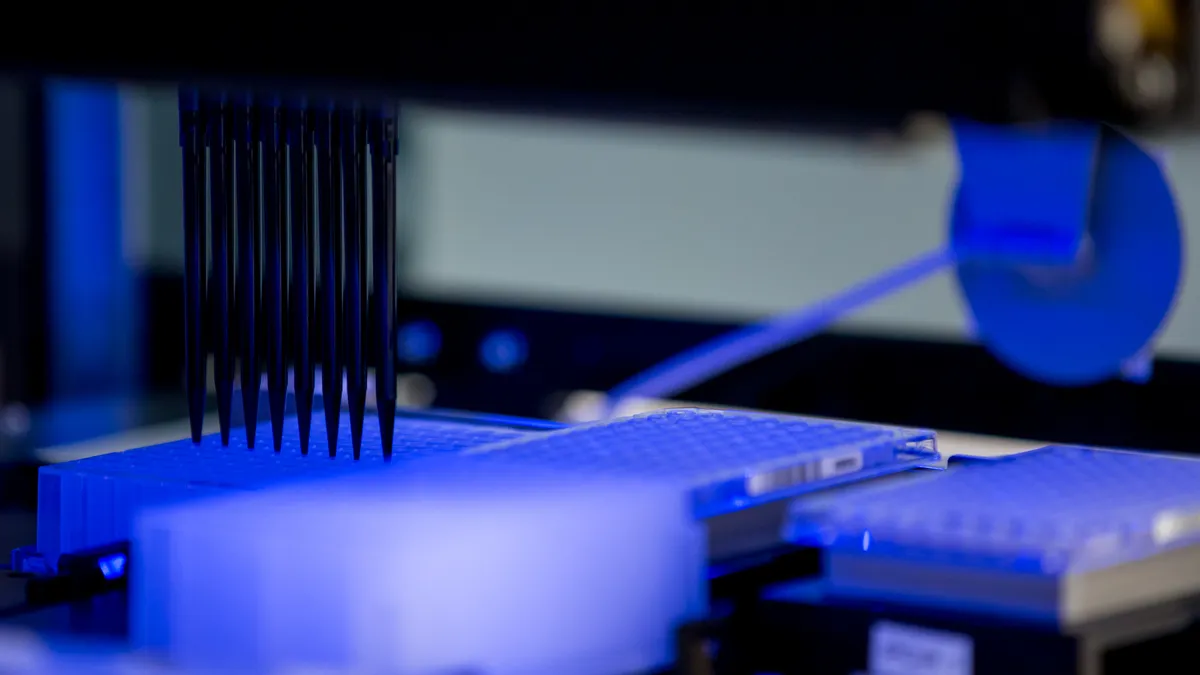Dive Brief:
- Guardant Health has reported data from a 20,000-subject clinical trial of its colorectal cancer blood test, delivering results that it thinks are good enough to win approval and reimbursement.
- However, key results fell short of analyst expectations. The liquid biopsy achieved 83% sensitivity overall, compared to the 85% or more targeted by analysts, and the 13% sensitivity versus pre-cancer advanced adenomas suggests the test underperforms rival Exact Sciences’ Cologuard test in that regard.
- Guardant’s share price fell 27% to $30 after the release of the news, which raised questions about whether the test can secure a label and reimbursement terms that enable it to drive sales growth and hold off competition from Exact Sciences and forthcoming competitors.
Dive Insight:
Guardant ran the ECLIPSE trial to show that its blood-based screening test can detect colorectal cancer. The study assessed two versions of the Shield Test, a cell-free DNA (cfDNA)-only test and a cfDNA test with protein biomarkers. Guardant has only shared data from the cfDNA-only test, which performed the best.
The test achieved 90% specificity, in both individuals without advanced neoplasia and in those who had a negative colonoscopy result, and thereby matched Exact Sciences’ existing stool-based Cologuard test and the Centers for Medicare & Medicaid Services’ threshold for coverage. Analysts at William Blair called sensitivity a “check the box” result, but said the result “did not help sentiment” based on early feedback.
Sensitivity is the main source for analysts’ negative sentiment on Shield’s benefit for Guardant’s business. At 83%, the overall figure fell short of the 85% sensitivity listed by J.P. Morgan analysts and the “high-80s percentage range” targeted by the team at William Blair. Overall Cologuard sensitivity was 92% in its DeeP-C study.
Guardant is yet to break down sensitivity by stage of cancer, but the William Blair analysts made an educated guess based on the available data. The analysts think combined stage I and II sensitivity likely falls “in the mid- to high-70% range.” Cologuard’s combined stage I/II sensitivity is 94%. Colorectal cancer is most treatable when detected in stage I or II, making that measure of sensitivity important for Shield.
The failure of the test to meet performance expectations led the William Blair analysts to ask questions about its ultimate use-case and commercial success. The questions cover topics such as whether the Food and Drug Administration will approve Shield for primary screening and whether the United States Preventive Services Taskforce will recommend the test.
“This is not to be overly negative on the test, but rather to note that the hurdle here is likely taller with these data. It is also not to say there is no place in the market for a test like this, because there is, but these data make it hard for us to endorse the notion that this test will materially impact Cologuard’s trajectory,” the William Blair analysts wrote in a note to investors, referring to Shield’s rival.
The team at J.P. Morgan was more positive about the results. While noting that “competitive noise” from Exact Sciences is likely to linger, the analysts still see Shield as a first-in-class blood-based screening test that can “unleash a vast [total addressable market] of unscreened population.”
“Even with 80% sensitivity, Shield can still easily address a $1B market (for CRC screening alone),” the J.P. Morgan analysts wrote. “Therefore, we believe solid execution on Shield’s commercial rollout and regulatory/reimbursement/guideline pathways should drive significant upside over time.”
Guardant plans to complete its premarket approval submission to the FDA in the first quarter of 2023.











